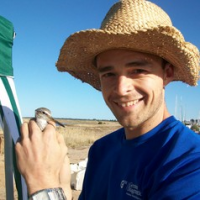Articles / Update on Q fever in Australia


writer
Associate Professor in Veterinary Epidemiology and Public Health, Charles Stuart University

writer
Senior lecturer, School of Animal and Veterinary Science, University of Adelaide

writer
Academic, Veterinary Biosciences, University of Melbourne

writer
Senior Lecturer Population Health & Biosecurity, The University of Queensland,

writer
Postdoctoral Fellow in Disease Ecology, The University of Queensland
With several hundred cases diagnosed each year, Australia has one of the highest rates of Q fever worldwide.
Q fever is a bacterial infection which spreads from animals; mainly cattle, sheep and goats. It can present in different ways, but often causes severe flu-like symptoms.
Importantly, the bacteria that cause Q fever favour dry, dusty conditions, and inhalation of contaminated dust is a common route of infection.
There are now fears the ongoing droughts in Queensland and New South Wales may be increasing risk of the disease spreading.
But there are measures those at risk can take to protect themselves, including vaccination.
Q fever is an infectious illness caused by the bacterium Coxiella burnetii, one of the most infectious organisms around.
Q fever is zoonotic, meaning it can transmit to people from infected animals. It’s usually acquired through either direct animal contact or contact with contaminated areas where animals have been.
Goats, sheep and cattle are the most commonly reported Q fever hosts, although a range of other animals may be carriers.
Because of this association with livestock, farmers, abattoir workers, shearers, and veterinarians are thought to be at the highest risk of Q fever.

Allergen Introduction – Practical Tips for GPs

Oral Contraception Update

What do we do With High Triglycerides?

An Update on Heart Failure in Primary Care

writer
Associate Professor in Veterinary Epidemiology and Public Health, Charles Stuart University

writer
Senior lecturer, School of Animal and Veterinary Science, University of Adelaide

writer
Academic, Veterinary Biosciences, University of Melbourne

writer
Senior Lecturer Population Health & Biosecurity, The University of Queensland,

writer
Postdoctoral Fellow in Disease Ecology, The University of Queensland

Very overestimated
Moderately/slightly overestimated
Quite accurate
Moderately/slightly underestimated
Very underestimated
Listen to expert interviews.
Click to open in a new tab
Browse the latest articles from Healthed.
Once you confirm you’ve read this article you can complete a Patient Case Review to earn 0.5 hours CPD in the Reviewing Performance (RP) category.
Select ‘Confirm & learn‘ when you have read this article in its entirety and you will be taken to begin your Patient Case Review.





